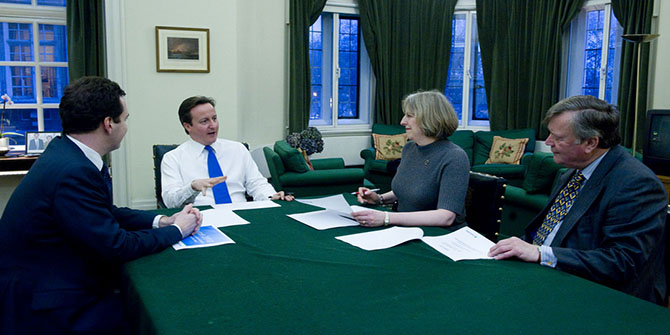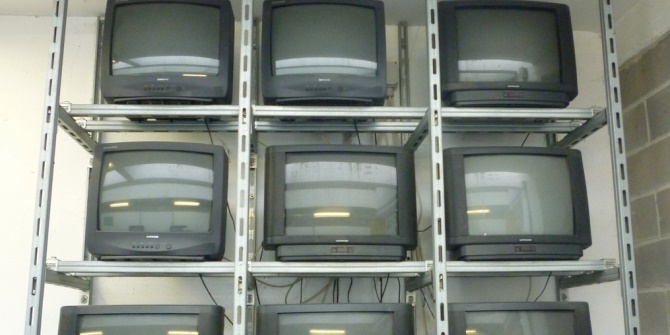 The latest edition of Transparency International’s Corruption Perceptions Index was published on 21 February. On the face of it, UK policymakers should be pleased: Britain has risen from 10th to 8th place. Daniel Hough explains why the UK shouldn’t be complacent about its cosy rating.
The latest edition of Transparency International’s Corruption Perceptions Index was published on 21 February. On the face of it, UK policymakers should be pleased: Britain has risen from 10th to 8th place. Daniel Hough explains why the UK shouldn’t be complacent about its cosy rating.
Fred Astaire, the famous old crooner, once famously claimed “while there’s music and moonlight, and love and romance” we should all enjoy ourselves and simply “face the music and dance”. Dancing and romancing is something everyone can enjoy even when, as Astaire showed in the film that made that song famous, Follow the Fleet, “there may be trouble ahead”. Knowing that trouble is potentially around the corner, in other words, doesn’t mean people choose to act to avert it. They can and do still choose to concentrate on other things.
Didn’t they do well!
Those famous lyrics – written by Irving Berlin back in 1936 – can be quite fittingly applied to the UK’s position in the newly released Corruption Perceptions Index (CPI). On the face of it, the UK does relatively well. 8th out of 180 and a score (82) that is improving is surely no bad place to be. Setting aside all methodological shortcomings of the CPI, the fact that the UK is an open democracy with a free press, that it possesses strong institutions that ensure that the rule of law is upheld, bodes well. Compared to the performances of many others, it looks like at least some singing and dancing wouldn’t be out of place.
And yet, you don’t have to be a staunch pessimist to recognise that the UK could be flying towards turbulence. David Cameron, for all his multiple sins, made a strong play of pushing the UK’s anti-corruption agenda forward. He held a well-attended global anti-corruption summit, he brought in the UK’s first national anti-corruption plan. He embraced the need to try and be more open about who the beneficial owners of companies were. Not everything went to plan in Cameron’s anti-corruption world, but there’s a case to be made that his legacy in this area will be positive.
Theresa May and anti-corruption
The situation looks rather different under Theresa May. The UK does now have an Anti-Corruption Strategy, but as TI’s Rachel Davies explains, whilst the direction of travel is clear enough and parts of it are indeed encouraging, there are still disarming gaps in key areas of concern. Davies highlights the lack of any analysis of corruption issues with UK politics (lobbying, gaps in the why is parliamentary behaviour is regulated and so on), the unwillingness to push for a stronger criminal corporate liability offence for economic crime and the complete silence around the issue of how the UK’s overseas territories behave in terms of public registers of beneficial ownership.
The anti-corruption strategy remains the high point of the May anti-corruption era. There has been very little meaningful discussion on how the Prime Minister plans to build on her predecessor’s work. It’s not that she has repudiated Cameron’s approach; there’s simply been too little of substance to do justice to the challenge.
In truth, that fits in with May’s past record at the Home Office. When corruption was obviously interlinked with security issues, the Home Office generally sounded interested. And, indeed, the December 2017 Anti-Corruption Strategy recognised the security challenges that corruption helps engender in the domestic arena. But when corruption has been discussed as a standalone issue, or as a problem intertwined with non-security-related concerns, the discussion lost steam.
The move to unite anti-corruption bodies in the National Crime Agency – a pet project of May’s – prompted both resistance and indeed an exodus of many officials with years of experience. May’s long-standing and well-documented suspicion of the Serious Fraud Office did little to improve things.
Brexit
If coupled with the continued neglect of corruption as a policy challenge, the UK’s departure from the European Union could add an extra dimension to this problem.
Brexit doesn’t bode well for the UK’s reputation as a low-corruption country. Given the country’s departure from the EU’s single market and in all likelihood the EU’s customs union, the UK will increasingly be trying to trade in places where corruption is a serious problem. Indeed, it will have to, if it wants to maintain current levels of prosperity. In many ways, fostering deeper trade links with countries in the developing world makes sense, but that inevitably means asking British companies to trade in environments where corruption is a serious challenge. Ask GSK. Or Rolls Royce.
Given the political imperative of making Brexit a success, there’s clearly reason to worry that tackling corruption might well slip further down the priority list. Further developing risky trade partnerships, which are perceived by some Brexiters as useful to meet their political goals, might well sound more attractive than stressing the importance of an anti-corruption agenda that is likely not to enjoy high popularity in the places where the UK is looking to develop business links. The recent impressive work by the Serious Fraud Office notwithstanding, the temptation to overlook corruption issues may increase.
The UK has much to be proud of when it comes to tackling corruption, but that can’t be a good reason for taking one’s eye off the ball. Complacency is rarely a sensible policy position and benign neglect even less so. Tackling corruption requires governments to be aware of the challenges that they face and to be aware of those that are just around the corner. It’s not clear that the UK government really is doing that.
______
About the Author
 Dan Hough (@thedanhough) is a Professor of Politics at the University of Sussex and Director of the Sussex Centre for the Study of Corruption (SCSC).
Dan Hough (@thedanhough) is a Professor of Politics at the University of Sussex and Director of the Sussex Centre for the Study of Corruption (SCSC).
All articles posted on this blog give the views of the author(s), and not the position of LSE British Politics and Policy, nor of the London School of Economics and Political Science. Featured image: Transparency International, CPI 2017 (February 2018).







Very well said Dan but the reality is already corruption is here in British system now. The sad reality is today multi-cultural Britain still has uni-cultural leadership in the Public sector. One has to look at NHS and Snowy White Peak is very well written and many managers, leaders, and doctors have no accountability for their behavior and for wasting public money!
Today, NHS spends £127 Billion a year and sadly nearly £20 Billion is wasted due to silos working, club culture, old boys network and poor investment in IT and culture of bullying, harassment, and victimization.
Amount of money wasted in EU Bureaucracy is shocking. Leaders with authority but no accountability is the most dangerous form of leadership be it in UK, India, Europe or anywhere in the world.
With Brexit, things may get worse but it is for the national leaders to make sure there is good governance and good accountability for all.
The sad reality is today we British have forgotten British values of equality, inclusion, fairness, and accountability.
NHS reflects British society and Brexit is a wake-up call for the nation. We are a divided nation and we need good leaders who can unite the nation, create a thriving economy and make sure right people are appointed to the right jobs and right leaders are appointed who will treat everyone fairly and equally.
In a value-based organization, inclusion and diversity thrive and people are appointed only on merit and they are everyone is held to account.
Leadership is easy once you know how to do it. Good leaders care for the most vulnerable people of the society irrespective of their race, gender, ethnicity, sexual orientation and so on.
Brexit is a blessing in disguise but we British should not forget core British values and that is proper inclusion, diversity, fairness. When we all live together and work together we can create a great nation and if not we create a world of ‘Them and Us and in such a culture everyone suffers.
I fully agree. Working for a development institution focused on emerging economies I observe that the rule of law, transparency and prohibited practices are the daily struggle limiting and often preventing any business/economic engagement. Going in search of business off beaten track will raise the risks of doing business dramatically.
UK as a country has been often blind to large contracts with Middle Eastern regimes. I wonder how will it manage supporting its mid and small size companies dealing with certain Asian, African or post-soviet countries where tribal or family allegiance are more important than rule of law, where bribes are customary, there is little transparency and judges are either ill equipped or corrupt.
Corruption definition: European Union
There had to be an anti-Brexit twist didn’t there? How about analysing the EU as totally opaque in its expenditure, or that the unelected and unrecallable Commissioners refuse to disclose their expenses? Or that the Commission directs grants to minor states as a direct bribe for voting support among the Council of Ministers – we can ignore the Parliamant in Brussels/ Strabourg which pergrinations are likewise rather strange in that they involve a contractor to drive empty lorries between the two places.